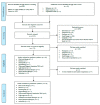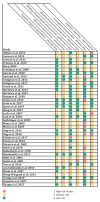A Systematic Review and Network Meta-Analysis of Randomized Controlled Trials Evaluating the Evidence Base of Melatonin, Light Exposure, Exercise, and Complementary and Alternative Medicine for Patients with Insomnia Disorder
- PMID: 32580450
- PMCID: PMC7356922
- DOI: 10.3390/jcm9061949
A Systematic Review and Network Meta-Analysis of Randomized Controlled Trials Evaluating the Evidence Base of Melatonin, Light Exposure, Exercise, and Complementary and Alternative Medicine for Patients with Insomnia Disorder
Abstract
Insomnia is a prevalent disorder and it leads to relevant impairment in health-related quality of life. Recent clinical guidelines pointed out that Cognitive-Behavior Therapy for Insomnia (CBT-I) should be considered as first-line intervention. Nevertheless, many other interventions are commonly used by patients or have been proposed as effective for insomnia. These include melatonin, light exposure, exercise, and complementary and alternative medicine. Evaluation of comparable effectiveness of these interventions with first-line intervention for insomnia is however still lacking. We conducted a systematic review and network meta-analysis on the effects of these interventions. PubMed, PsycInfo, PsycArticles, MEDLINE, and CINAHL were systematically searched and 40 studies were included in the systematic review, while 36 were entered into the meta-analysis. Eight network meta-analyses were conducted. Findings support effectiveness of melatonin in improving sleep-onset difficulties and of meditative movement therapies for self-report sleep efficiency and severity of the insomnia disorder. Some support was observed for exercise, hypnotherapy, and transcranial magnetic resonance, but the number of studies for these interventions is still too small. None of the considered interventions received superior evidence to CBT-I, which should be more widely disseminated in primary care.
Keywords: exercise; hypnotherapy; insomnia; meditative movement therapies; melatonin; network meta-analysis; transcranial magnetic resonance.
Conflict of interest statement
The authors declare no conflicts of interest.
Figures










References
-
- American Psychiatric Association . Diagnostic and Statistical Manual of Mental Disorders (DSM-5®) American Psychiatric Pub; Washington, DC, USA: 2013.
Publication types
Grants and funding
LinkOut - more resources
Full Text Sources

